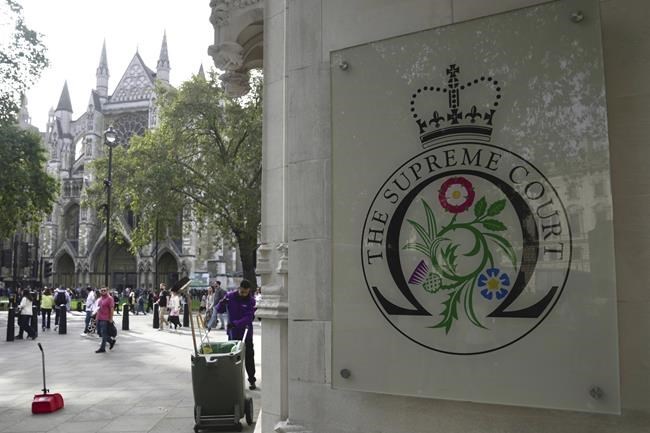LONDON (AP) — Britain’s Supreme Court ruled Wednesday that the government’s contentious plan to send some migrants on a one-way trip to Rwanda is illegal, striking a major blow to a key policy of Prime Minister Rishi Sunak's government that has drawn international attention and criticism.
Five justices on the country’s top court said asylum-seekers would be “at real risk of ill-treatment” because they could be sent back to their home countries once they were in Rwanda.
Britain and Rwanda signed a deal in April 2022 to send some migrants who arrive in the U.K. across the English Channel to the East African country, where their asylum claims would be processed and, if successful, they would stay.
Britain’s government argues that the Rwanda policy will deter people from risking their lives crossing one of the world’s busiest shipping lanes, and will break the business model of people-smuggling gangs. Opposition politicians, refugee groups and human rights organizations say the plan is unethical and unworkable.
No one has yet been sent to the country as the plan was challenged in the courts.
Reading the unanimous decision, President of the Supreme Court Robert Reed said Rwanda could not be relied on to keep the promises not to mistreat asylum-seekers sent from Britain.
He cited the country’s poor human rights record, including enforced disappearances and torture, and practiced “refoulement” – sending migrants back to home countries where they could be at risk.
The first deportation flight was stopped at the last minute in June 2022, when the European Court of Human Rights intervened.
In December, the High Court in London ruled that the Rwanda plan is legal, but that the government must consider the individual circumstances of each case before putting anyone on a plane.
The Court of Appeal in June backed a challenge by asylum-seekers from countries including Syria, Vietnam and Iran. The court ruled that the plan was unlawful because Rwanda is not a “safe third country” and there was a risk that migrants sent there would be returned to the home countries they had fled.
That was challenged at the Supreme Court by the government, which argued at a hearing last month that it had thoroughly assessed the risks and would ensure that Rwanda’s government abides by its agreement to protect migrants’ rights.
Much of Europe and the U.S. is struggling with how best to cope with migrants seeking refuge from war, violence, oppression and a warming planet that has brought devastating drought and floods.
The U.K. receives fewer asylum-seekers than many European nations, including Germany, France and Italy. Thousands of migrants from around the world travel to northern France each year in hopes of crossing the Channel. Sunak has pledged to “stop the boats.”
More than 27,300 migrants have crossed the Channel this year, with the year’s total on track to be fewer than the 46,000 who made the journey in 2022. The government says that shows its tough approach is working, though others cite factors including the weather.
The Rwanda policy was championed by former Home Secretary Suella Braverman, who was fired by Sunak on Monday over a series of intemperate statements that deviated from the government line. In the weeks before her sacking she described migrants as a “hurricane” headed for Britain, called homelessness a “lifestyle choice” and accused police of being too lenient with pro-Palestinian protesters.
Braverman has called for the U.K. to leave the European Convention on Human Rights and its court if the Rwanda plan is blocked.
The U.K. government had said it aims to strike similar deportation deals with other countries if the Rwanda plan succeeds. It argues several other European countries are considering similar ideas, with the European Union exploring setting up processing centers on the bloc's borders to screen people as they arrive.
Italy recently reached a deal with Albania for the Balkan country to temporarily house and process some of the thousands of migrants who reach Italian shores.
Unlike the U.K. plan, however, the journey would not be one-way. Successful asylum-seekers would get to start new lives in Italy, not Albania.
Jill Lawless, The Associated Press

